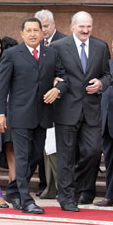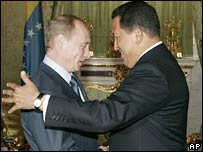How did Venezuela get so unstable?
Time to step back from the political play-by-play – in this post, I want to explain to a broader audience how on earth Venezuela got into such a huge mess in the first place. I realize how baffling our political crisis must seem to an outsider. Here's a conceptual primer.It seems like it's been much longer, but the political crisis in Venezuela has been going on for 27 months. It all started with the approval of 49 new laws by presidential decree on November 13th, 2001 - more than two and a half years after Hugo Chavez took office. The crisis has waxed and waned since, but it has never gone away.
Until mid-2001, Chavez had basked in stratospheric approval ratings, and his dominance over the country's politics had been total. For a number of reasons, those poll numbers started to drop at the beginning of 2001. Within months, what had been an 80%-20% country had turned into a 40%-60% country, with a majority opposing Chavez for the first time.
That’s the first thing to bare in mind: the political crisis only really started after this
turn around in the polls. 
Source: Datanalisis. Question wording: "how do you evaluate the work of President Hugo Chavez for the welfare of the country?" Sample size: 1,000. Interviews conducted generally at respondents' homes.
Chavez's honeymoon was long and eventful. In those first two and a half years in power, he completely reshaped the Venezuelan political landscape. He commissioned a new constitution, packed the supreme court with cronies, changed the country’s official name, packed the prosecution service with cronies, crushed the old political class into irrelevance, packed the electoral council with cronies, declared himself leader of a revolution, packed the public administration with cronies and made generals sell discount vegetables to the poor. Through it all, he basked in the people's genuine adulation for it.
49 lawsAfter pushing through his radical political reforms and being re-elected with 60% of the vote in 2000, Chavez moved on to his substantive agenda. In November 2000 he used his two-thirds majority to get the National Assembly to grant him special powers to legislate by decree. For twelve months, the president had carte blanche to change any law he wanted in any way he wanted. It was pretty extraordinary, but in the zero-opposition atmosphere before the turn around in the polls, he got away with it.
The way Chavez handled this unique opportunity says much about his core ideology, and created the political crisis the country is still wading through today. Instead of consulting with stakeholders, as had been the tradition in Venezuela, Chavez drafted the new legislation behind closed doors, with no public consultation. In fact, most of
the 49 laws he decreed were presented as a
fait accompli on November 13th, 2001 - the very last day of his special powers period.
There was no public debate, no public scrutiny, no chance to influence policy at all.
Now, contrary to how it has sometimes been presented, for the most part the new laws were not all that radical. Some, like the
Lands' Law, were bound to be
controversial, but many others were quite innocuous. They were markedly statist in many places, yes, and cumbersome and unrealistic in many others, but really the fight that developed was much more about process than content.
What really alarmed the opposition was
the president's strident unilateralism, his angry refusal to even talk about the reforms with evident stakeholders before enacting them into law.
Take
commercial fishermen, just as an example. The new Fisheries Law Chavez decreed radically changed the ground rules in their industry. It limited the range of waters they're allowed to fish, so it evidently affected them, and negatively. But since they were never consulted about it, none of their quite legitimate concerns could be taken into consideration. The Chavez law had no provisions at all to soften the blow, no phase in period, no investment tax breaks to help meet the regulations, no technical assistance to help the fishermen comply, nothing. None of the mechanisms the fishermen might have bargained for were in the law simply because the government refused, as a matter of principle, to bargain with them.
Worse still, when the fishermen protested, the government denounced them as
counterrevolutionary elements and enemies of the people. This cemented the growing perception that the government was not just indifferent to them, but actively hostile.
The irony is that the Fisheries' Law is arguably quite a good, forward-looking piece of environmental legislation. By refusing to even try to build a consensus around the new rules and instead antagonizing the stakeholders, Chavez undermines the possiblity that it will ever be implemented properly.
It’s the sectarianism, stupidIt's easy to forget that, back in late 2001, all the opposition movement was really asking for was
for the government to "correct course." We demanded space for
dialogue, for a
formal channel of communication with the government and some chance to scrutinize and comment on policy proposals
before they were enacted into law.
"Rectification" was the word on
everyone's lips. It was Chavez’s strident refusal to legislate inclusively that led to the very first
one-day general strike, on Dec. 10th, 2001 - and even then, what the strikers demanded was for the government to sit down and discuss the new laws, nothing more.
Again and again, Chavez responded with
bluster and scorn. He demonized those who complained about our exclusion, often substituting ad hominem attacks and vicious broadsides for political argument. He made it clear to us that the revolutionary state was there to disenfranchise us, to free the political arena from the pernicious influence of counterrevolutionary thinking.
This was especially ironic given that Chavez's early political rhetoric was predicated around a single word: participation. Throughout 1998 and 1999, when he was riding high in the polls, Chavez never stopped talking about radical, grass-roots democracy, about empowering the people, and opening state decision-making to the masses. That rhetorical line lasted exactly as long as his majority in the opinion polls did.
By late 2001, opinion polls showed vast majorities of Venezuelans favoring a change in tone from the government.
85% of respondents (including, necessarily, a good number of chavistas) told IVAD's pollsters that they wanted Chavez to "change his attitude." In effect, what Chavez was proposing was shutting out the majority of the public from the political process...all in the name of "participatory democracy"!
Chavez equated all dissent with treason; all dissidents were branded enemies. It was not hard to recognize the autocratic thrust of this style of politics.
For the government, letting anyone from outside "the process" participate in policy-making would have meant accepting the opposition's legitimate right to speak for a substantial portion of the country. The government understood that sitting down to talk to those fishermen would have meant honoring the right of dissenters to exercise full citizenship rights, and implicitly abandoning the official fantasy that only hyperprivileged coup-plotters opposed the government. This Chavez has never been prepared to do.
Much of what the opposition wanted was a show of respect from the regime, some symbolic acknowledgment of our right to participate in our political process freely.
By early 2002, after the government had made it clear it would not extend such symbolic recognition, the opposition changed strategies. We imagined we could force the government's hand by taking to the streets in protest. We figured that if hundreds of thousands of us marched on the streets of Caracas, it would be impossible for the government to continue to dismiss us as an irrelevant plutocratic fringe.
One huge street march after another was organized, some nearing a million participants. Even then, even against the evidence of their and everyone else's senses, the government continued to dismiss the opposition movement as little more than a coup-plotters' private club. The vicepresident's pig-headed refusal to recognize the blindingly evident became the stuff of punchlines (and angry tirades) in opposition circles.

These people do not exist.
It's not surprising that many in the opposition went possitively batty after being dismissed and villified in this way again and again. To this day, the government maintains that the dozens of polls and scores of marches are a media fabrication. Go through the official media,
Venpres or
VTV, and you’ll be left in no doubt: a fringe of oligarchical wreckers notwithstanding, the country is overwhelmingly united behind Chavez.
How this profession of faith squares off with their panicked attempts to stop a recall vote has always been particularly hard to understand. But the president's attitude towards the political rights of those who disagree with him has never been particularly nuanced. Talking about the boxes containing the forms with several million signatures for a recall referendum, Chavez recently said they were "full of trash."
That, in the end, is what our citizenship rights are to him: trash.
Why, oh why does Chavez behave this way? It's one of those imponderables, but my guess is that it comes down to his own narcissistic fantasies-cum-ideology. Chavez truly believes he has a democratic mandate for revolutionary change, and if you really think you're leading a revolution, the notion of recognizing the political rights of counter-revolutionaries and class enemies is plainly nonsensical.
Within the government's sectarian view of political reality, excluding dissidents makes good sense. If your aim is to politically destroy a given group, what could possibly be the point in reaching a settlement with them? When it comes down to it, you might cooperate with your adversaries, but your enemies you fight.
Cooperate or fight?At its root, the conflict reveals a wide gulf between the basic political philosophies of the two sides, between the ways that, deep down, each understands political life. The government sees politics as a zero-sum game between social classes. There is a fixed amount of power in society, and social classes continually fight over it. One class’s loss is another’s gain. In order for the poor to win, the rich have to lose. There is no room for negotiation and accommodation between opponents in this simplified Marxist worldview, only struggle.
The opposition, on the other hand, has a pluralist view of political reality. To a pluralist, the total stock of power in society is not fixed; it can grow or shrink over time. Games can be either positive-sum or negative-sum – one side’s gain is not necessarily the other side’s loss – so opponents have a natural interest in cooperating. In this view, the other side's loss is nothing for your side to cheer about – it could simply mean that you will also lose out soon. To a pluralist, nothing could seem more natural than consulting new policies widely and taking a keen interest in the input of the stakeholders, whether they're politically close to you or not.
Chavez's ideology is fundamentally incompatible with pluralist bargaining and cross-class co-operation. The zero-sum view leads him naturally towards maximalism - a tendency to equate consensus with surrender. Ideological rigidity becomes a badge of honor when you see the world in such terms, compromise becomes a matter of shame.
Protests coming from the other side – “the squeals of pigs on their way to the slaughterhouse,” Chavez dixit - come to be seen as indicators that great strides are being made on the road to social justice: if the old elite is really, really unhappy that
must mean that they are losing power in society, and if they’re losing power in society that
must mean the poor are gaining a corresponding amount of power. Perversely, making the other side unhappy becomes a policy goal, insofar as you see the unhappiness of your enemies as a sure-fire indicator that you're empowering your supporters.
The possibility that in marginalizing your enemies you might set off a negative-sum game where everyone loses is just never considered.
It's in this context of a clearly autocratic government determined to exclude all dissenting views that we have to examine what has happened over the last 27 months. Opponents' reactions to Chavez's autocracy have sometimes been extreme, destructive and unjustified. Both in April 2002 and in the December-January general strike, it's obvious to me that the opposition made big, bad mistakes. It's also clear that those mistakes were over-reactions to very real grievances against a government that had made a point of excluding us from public life.
What Venezuela has learned over the last 27 months is that, in the absence of old-style dictatorial repression, such sectarian governance is deeply destabilizing. The instability it generates makes it impossible for the government to reach its social goals. The gigantic can of worms Chavez has opened in terms of dissent, protest and instability, makes it impossible for his government to help the poor.
Because the dirty little secret is that political life is not, in fact, a zero-sum game. As the last few years should make more than evident, it's perfectly possible to govern in a way that screws both the rich and the poor. So long as we're led by those who imagine that every anti-rich policy is, by definition, pro-poor, we'll be stuck in the miserable negative-sum game Venezuela has become.
Please comment responsibly:
|
Jimmy Carter, Hugo Chavez, CNE, OAS, Most of the Opposition and Caracas Chronicles Agree...
The CNE verification roller-coaster saga continues, a rapid-fire alternation of seemingly dreadful news and, now and then, heady optimism. Today, at least, the news is good.
It took just 48 hours for Jimmy Carter,
who commands unique respect across the political spectrum in Venezuela, to personally broker a sensible compromise that nearly all sides can live with.
Teodoro is
understandably ecstatic.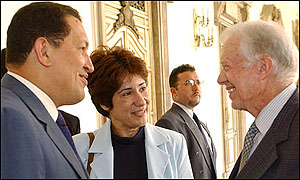
Almost all the stakeholders are reading from the same hymn book now - itself a fantastic achievement. Now that
all sides have agreed that
Carter Center/OAS observers should be granted broad access to
every part of the signature verification process, it only makes sense for all sides to pledge to
accept CNE's eventual decision, whatever it may be.
The only question now is why Accion Democratica insists on holding the opposition as a whole back from undertaking this tremendously significant commitment.
...sigh...
As for the politics of all of this, I think Miguel over on
Devil's Poop has it about right when he writes,
I have believed for quite a while that Chavez's strategy is simply to proceed forward and go to the recall referendum. He believes that the magic number of 3.8 million votes by the opposition simply will not be reached as most Venezuelans are apathetic about the whole conflict. He may be right in his assessment. I never cease to remind people that in the heyday of his popularity Hugo Chavez never received more than 3.757 million votes. He was really popular among those that voted, but abstention was 43.7% of the registered population. A repeat of that, adding a bit of 'Misiones', some doses of populism, some threats and the number may not be reached. However, this also implies that Hugo Chavez may not get more than 2.4 million votes in his favor, severely damaging the President's image. Abstention will in fact be the deciding factor, if it is near 50% the recall fails assuming the 60%-40% split against Chavez polls indicate. If it is near 40% the recall is successful.Andy Webb-Vidal's FT piece, comes to the same conclusion after alluding to (but not quite giving us) fresh poll data "suggesting that the opposition's chances of unseating Mr Chavez at the ballot box have collapsed, while he continues to enjoy a steady 35 to 40 per cent backing - which could be enough to save him."
Of course, in the end you can get that Excel spreadsheet to toss back any result you want. It all comes down to turnout, and that, by nature, is unpredictable.
Pura CovaIn the same piece, Andy dishes some delicious inside nuggets into the murky world of opposition decision-making, and reports Manuel Cova is quickly becoming a consensus candidate for key parts of the opposition, specifically the TV station owners - who, like it or not, have a big say in the matter.
Knowing how the four horsemen operate, they've probably focus grouped and polled the hell out of this decision. It's not surprising Cova would come out on top: he's black, working class, and frighteningly bright and eloquent. His judgement as post-Ortega head of the Labor Movement has not always been perfect, but it's been far better than what came before. And I'm sure they see him as a safe pair of hands.
Yes, he's an adeco at heart, but I very much doubt a President Cova would take orders from AD's CEN. To be frank, I think we could find much worse consensus candidates than Cova - and if they play it right, he could play a big role in boosting turnout to a recall vote.
Please comment responsibly:
|
The oracle speaks...
...other pundits I read, but Teodoro Petkoff I follow. Teodoro is more than an analyst. He is a consistent voice for reason, principle and good sense in a political atmosphere where these qualities are sadly too rare.
So today, when he uses his
TalCual editorial to warn CNE head Francisco Carrasquero to look again into Zamora's allegations of irregularities inside CNE, I sit up and take notice.
As Teodoro reminds us, TalCual has editorialized in favor of CNE 35 times over the last few months. His comments are not those of a wrecker. They're those of a principled observer, concerned by consistent reports of irregularities. Teodoro understands that CNE needs to take action on these allegations to preserve its own credibility.
Teodoro Petkoff speaks with a moral authority few in Venezuela command. We can only expect his views are taken seriously for once.
Nag: those of you who read Spanish and have not done so really ought to consider subscribing to TalCual. Top notch reporting, enlightened editorializing...the paper is in a league of its own. They really need readers' support to keep publishing.
Please comment responsibly:
|
New on Caracas Chronicles
Things are changing on this blog!
1.By sisterly demand, now you can post your comments at the end of each entry.
2.Check out the very silly, very fun
mixed websites you can make with this very cool toy:
TopFX website mixer. Great fun.
3.Also by reader demand, the RSS site feed is up! Now you can get Caracas Chronicles delivered to your PDA or newsreader automatically. The RSS site feed
is here. And if all of that is gobbledygook to you, it is to me as well!
4.There's a new
bio that tells you considerably more than you probably want to know about me.
Please comment responsibly:
|
Caracas journalism good enough to translate
Aliana Gonzalez must be one of the gutsiest and most talented journalists in Venezuela today. Though I don't know her personally, I contacted her to ask permission to translate and reprint this powerful piece. Too often my polemics about the rule of law and the chaos of the zero-prosecution society must seem abstract, distant, irrelevant. Some probably figure that the rule of law is something only the bourgeoisie worries about. Read Death at Dawn, and think again.Death at Dawn
by Aliana Gonzalez, photos by Ilich Oteroreprinted from the Jan. 21st edition of TalCual, translated by meRusleidy Lopez is still scared.
The policeman was very clear: "if ever we find out you've said anything, we're coming back for you". On Monday, at 3:00 p.m., they went by the house dressed as civilians, armed, with their bullet-proof vests on and yelled "the women of this barrio are going to cry tears of blood." That night, she decided to sleep at her mom's place again.
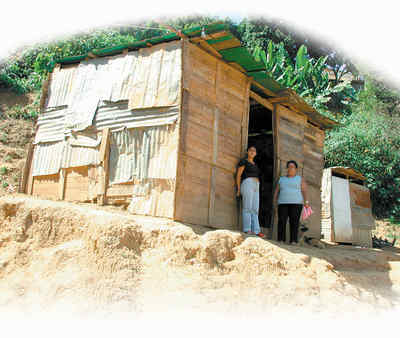
Rusleidy's home
The splattered blood that Orlando Jovany Sosa, her husband, left as he died is still visible on the wood and zinc walls, papered over with newsprint and magazine covers. On january 8th, at 4 in the morning, Policaracas (Caracas Municipal Police officers) and CICPC officers arrived at her house dressed in black and wearing ski masks. Some let their faces be seen.
"We were sleeping," she says "and I heard steps. I got up from bed, peered through a hole, and I saw the alley was full of policemen. I woke up Jovany. They kicked down the door, came in, and threw me out of the house. They took me into the woods and told me to stay there, because otherwise they would kill me as well. A quarter of an hour later they fired into the dumpster. Then they asked me 'what was the name of your husband?' 'Orlando,' I said, but they say 'you lie, they used to call him the Zombie.'"
Rusleidy had her twentythird birthday yesterday.
She had lived with Jovany for five years, when he was 15 and she 17. Her house was a small room with a dirt floor and a bed as the only furniture.
The kitchen - a two-burner gas stove - is set on top of an overturned bucket, almost at floor level. In big bags she keeps what little she owns.
The house has no drinking water, she has to keep some in a pitcher. The bathroom is a letrine.
There is no fridge, no closet, no cupboards.
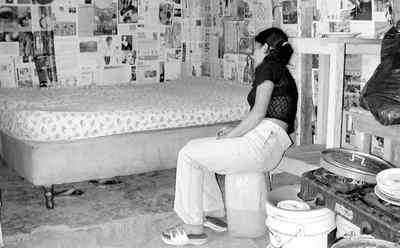
Rusleidy at home
This "Mata de Mango" area, in the El Setenta shantytown of El Valle, is on the edge of the city, near the woods. Even though misery is the rule, they enjoy a unique view of the city: you can see the Helicoide, the cementery, the highway and even Las Acacias.
Forced to signRusleidy was taken that day to CICPC - the investigative police [equivalent to the FBI.] Dawn was breaking.
"They grabbed me by the sweater," she says, "then by the neck and they put a gun to my ribs. I told them they were choking me and another officer said to let me go. When my mom and dad arrived, they threw me in a patrol car. I still didn't know what had happened to Jovany."
"I was in an office at CICPC headquarters until 9:30 that morning."
"An officer came and told me: 'you know that your husband didn't have a shootout with us, but we killed him because he's being accused of murder.'"
"They told me they would write a letter, and that if I didn't sign it, then I would pay for what they'd found in the house. The letter said that Jovany was running away from the cops, he took shelter at the house, had a shootout with them, but I managed to escape."
In the house, the cops found a gun and a little money.
"I don't know whose gun it is. I know Jovany was keeping it. The money was mine, from my work as a street hawker." After signing, the cops told her that "it's very dangerous to mess with the police; don't even think about making a formal complaint."
Look me in the faceMigdales Gonzalez, on the other hand, is not scared. She's the mother of Kelvin Gonzalez, who was killed by the same officers one hour later, at the other end of the barrio.
The version published in the press is that both had shootouts with the police. On top of the long distance between the two houses, there's the fact that neither had bullet holes on the walls, making the hypothesis fragile.
"I'm over my fear," Migdalis says, "I told the cop the same day they killed Kelvin: look me in the face, you killed my son and I'm not going to stay quiet about it, so you can go look for me at home to kill me."
Gonzalez is indignant with the director of the Policaracas for his statements.
"He said that everybody in this barrio is into drugs, that that's why they didn't say Kelvin and Jovany were neighborhood bullies. I've been working every day for years, and I am a respectable woman. People here get up early in the morning and go work and sweat for their money. Doesn't he respect people? I'm indignant that that is the explanation he gives, faced with the truth of the barrio. If they were really involved in shooting a cop, why didn't they arrest them and try them, so they could pay for their crime?"
In El Setenta the police has taken five lives, in similar circumstances, in less than four months.
Daniel Centeno, on October 9th, Cesar Augusto Kacen, four days later.
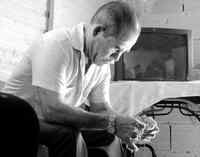
Daniel Centeno's dad
Kacen was 43 years old and was a nightwatchman in the public transport parking lot, on the barrio's sports field. At about 11:30 at night on 13th of October, Policaracas went up there. He was on the court, waiting for the minibuses.
A neighbor heard him beg and screem, calling for his mom, before the gunshot. "We buried Cesar ourselves because he had no family. His family moved away from the barrio years ago, and he stayed behind. He made a living carrying gas tanks, sand bags, and lately as a watchman. He had his problems, but he's grown up and he never messed with anyone," said Migdalis Gonzalez.
The other victim is Edison Jose Mendez. It was on December 12th, in identical circumstances as Jovany Sosa and Kelvin Gonzalez. Policaracas went in with ski masks, at 6 a.m., kicked out his family members, shot him, and then spread the word that he'd died in a shootout.
Please comment responsibly:
|
The epicenter of crunch time
or, Let the observers observe!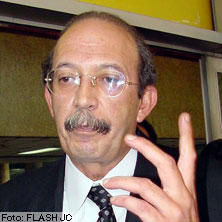
Zamora: Can-of-worms opener.
The last 24 hours were awful for the National Electoral Council. In the middle of a politically explosive process to verify the several million signatures backing the opposition's request for a recall referendum against Chavez, the council now faces some very serious allegations.
One of the five board members, Ezequiel Zamora, went public with
allegations of sabotage in the signature verification process. He claimed "some" CNE verifiers had excluded authorized personnel from the "physical verification process." Somewhat cryptically, he said "the percentages are not coming out properly." He was careful to keep politics out of his statement, but it's not hard to fill in the gaps. He said the problems could delay an already delayed decision and demanded that CNE staff follow the board's directives strictly.
The gravity of these allegations hardly needs to be stressed. Mature leadership is desperately needed to steer CNE out of this mess - the alternative is too volatile to even consider. Can they work this out internally and come up with a solution that rescues the organization's credibility?
CNE chairman Francisco Carrasquero claims the whole thing is a
big misunderstanding. I hope he's right. Even if he is, he should learn from this snafu and allow the international observers unfettered access to every part of the process. When observers are not present, it's easy for "misunderstandings" to generate a huge amount of suspicion that can be deeply damaging to the whole process. Especially if the accusations are false, Carrasquero should realize that the ONLY chance he has of convincing the world that CNE procedures are clean is by letting Carter Center/OAS watch everything.
It's significant that it was Ezequiel Zamora blowing the whistle in public. A nominally opposition-minded member of the council, Zamora had surprised everyone with his spirit of negotiation and bipartisanship. He's joined the chavista majority on more than a few votes, yielding a lot of 4-1 votes instead of the 3-2 decisions conventional wisdom had expected. Zamora may not like Chavez, but he's far from an opposition radical, far from a loose cannon. His statement was meant to bring staff into line, to keep the process transparent, not to throw it into crisis.
One other crucial decision remains on the council's plate. The matter of how much access Carter Center/OAS should have to the most critical stages of the verification process has yet to be discussed officially by the board. Much hangs on this decision, which could come as early as Tuesday.
My feeling is that the government fears close international observation more than anything else, because it would make the task of obstructing the referendum that much more difficult. It's disheartening that Chavez die-hard Congressman Nicolas Maduro went public hours later
to accuse the OAS of imperialism for its request to observe every part of the process. This speaks volumes about how effective the observation mission has been in dissuading foul play. And it puts renewed urgency on the call for CNE to allow observers into every nook and cranny of the entire process.
The council will need to make some hard choices in the hours ahead. To exclude Carter Center/OAS observers from parts of the verification process in this climate is a recipe for disaster. If the board wants to retain its credibility, it must conduct all procedures in broad daylight in front of credible, experienced observers of unquestioned credibility.
A thumbs-up from the Carter Center/OAS mission is the only way to keep an eventual decision credible to
all parties. Jimmy Carter did not spend half his adult life chasing a Nobel Prize only to squander his credibility at the last minute by signing off on a bogus election process.
This, right now, is the epicenter of crunch time. The country needs responsible leaders to take it through this very difficult juncture. If the provocateurs get their way, this little crisis could derail the referendum process altogether. This would really be a catastrophe.
The CNE Board has to take stock of the historic responsibility of the moment. It must understand that unfettered observation is better for
both sides. If I'm wrong and the signatures really are bogus, as the government claims, it's especially in the government's interest to have impartial observers in hand. CNE's decision to strike down the referendum will only be credible in Venezuela and the world if an institution like the Carter Center certifies the process that determined they are fake. Otherwise, nobody will believe them.
These are the kinds of situations that separate heroes from villains, people of integrity from opportunists. CNE must step up to the plate. Because the tag-line on this blog is dead serious. Venezuela really is teetering on the edge of a civil war, and killing the recall through opaque back room maneuvers in the absence of international observers would be an excellent way to push the country over that edge.
Please comment responsibly:
|








 Chavez Reelection Blog: Katy documents the government's use of public resources for Chavez's partisan advantage.
Chavez Reelection Blog: Katy documents the government's use of public resources for Chavez's partisan advantage.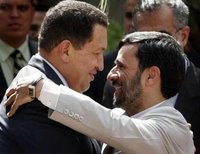
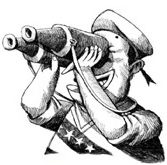
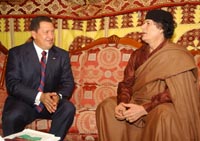
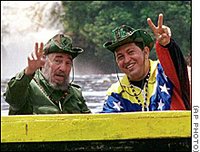
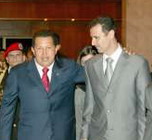
 Site feed
Site feed 